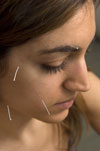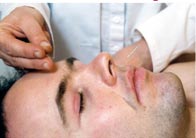Treatment of Allergy
by Chinese Acupuncture Clinic Acumedica
Acupuncture has been known to be the best alternative therapy for seasonal allergies such as hay fever and allergic rhinitis with excellent successful outcomes. According to the traditional Chinese theories, acupuncture works to prevent recurrence of allergic reactions by clearing the nasal passages and enhancing the immune system of the body.
Hay fever and Allergic rhinitis
Hay fever and Allergic Rhinitis are the seasonal allergies resulted from allergic reaction to certain types of allergens such as Pollens. In allergic reaction to pollens, the patients are usually sensitive to dust mites, animal dander, and molds. Millions of British peoples suffer from chronic seasonal allergies which are caused by the body's hypersensitivity to allergens in the surrounding environment. Usually the patients with rhinitis present either the symptoms of allergic rhinitis or allergic conjunctivitis. The typical clinical picture of Hay fever characterized by itchy eyes and throat, sinus congestion and sneezing, asthma, and even diarrhea are produced. The contact with allergen such as pollen stimulates the release of IgE antibodies (attach to white blood cells known as mast cells). These cells are mostly located in the lungs and upper respiratory tract, the lining of the stomach and the skin. Stimulation of these cells leads to the release of histamine which produces the allergic symptoms.
The Western Medicine managed all allergies with a known standard drug therapies, such as antihistamines (Chlor-trimetron, Benadryl, etc.) and Other types of drugs which act on the nervous system (Albuterol, epinephrine), cortico-steroids (prednisone), and decongestants. Unfortunately, these drugs might cause many side effects, such as drowsiness and immune system suppression as well as an over-reliance on them. Despite the fact that western medication and many over-the-counter remedies promise symptomatic relief, many patients with these allergies turn to use acupuncture as an alternative to these chemical medications and also to avoid the side effects created by them. Acupuncture is treating the whole person, and balancing the immune system which leads to long-term health benefits in managing allergies.
Can Acupuncture therapy help to Relieve Seasonal Allergies?


In Chinese Medicine, the allergic rhinitis is caused by Wind and a deficiency of the Protective Qi (energy) and all patients with a deficiency of Qi may catch colds easily and are more prone to have allergies such as Hay fever and rhinitis. Furthermore, there are many factors that may trigger the attack of Hay Fever or rhinitis such as the invasion of the external pathogenic factors, diet, emotional disturbances, congenital weakness and chronic illnesses. However, acupuncture treatment works by correcting the underlying imbalances within the body in order to relieve the acute symptoms of allergic rhinitis and also managing the root of the problems which are contributing to the body's reaction to allergens. Usually the acupuncture treatments are combined with special detoxification program which includes 2-3 days fasting and dietary modification.
The unhealthy diet can trigger allergy attack. Therefore, raw and cold food may lead to the stagnation of fluid circulation and the increase in the production of phlegm. Sugary and oily food tends to create phlegm and heat in the body. While the consumption of Fish, crabs, shellfish and other seafood may have also been noted to increase the likelihood of allergy attacks as well.
What is the research evidence of acupuncture in allergies?
The recent clinical trial on the effect of acupuncture on allergies was recently published in Annals of Internal Medicine. The researchers tried acupuncture on 422 people with allergies to grass and pollen and randomly assigned them to one of three groups. One group received 12 acupuncture treatments over eight weeks. Another was given sham acupuncture treatments equivalent to placebo, and a third group received no treatment. Each group had access to an antihistamine “rescue medication”. Eight weeks later, the patients in the acupuncture group had greater improvements in symptoms, compared with subjects in the other two groups, and they used the antihistamine less frequently. They concluded that acupuncture can help with symptoms of all types of allergies for both short and long terms.
